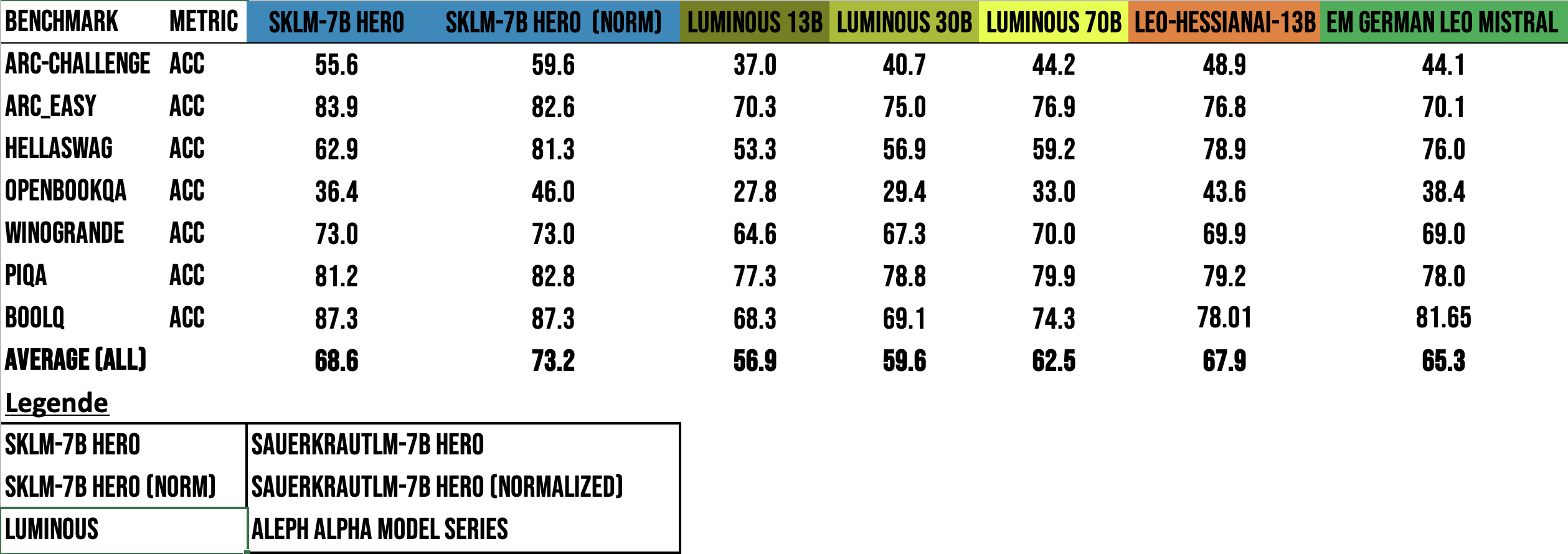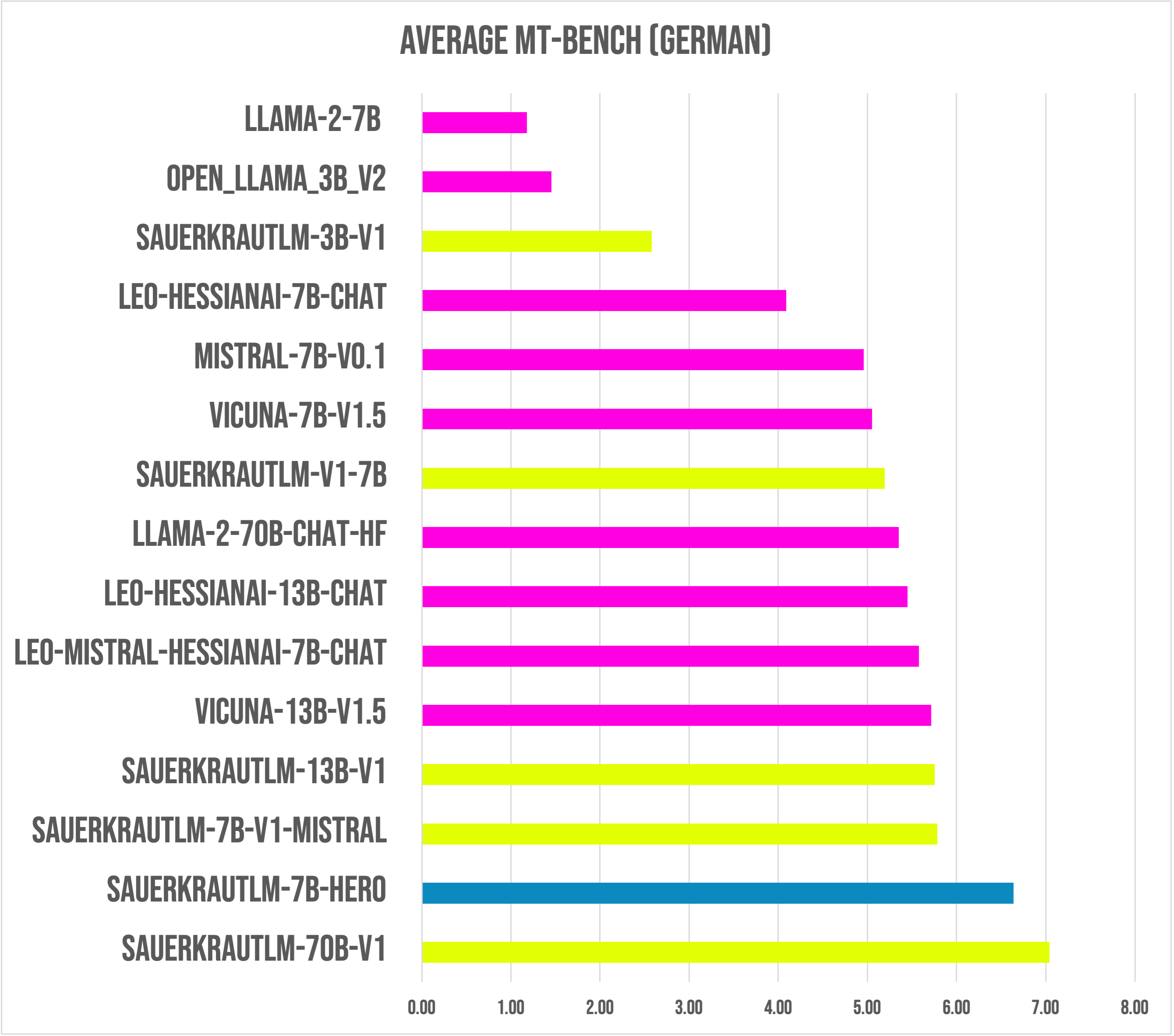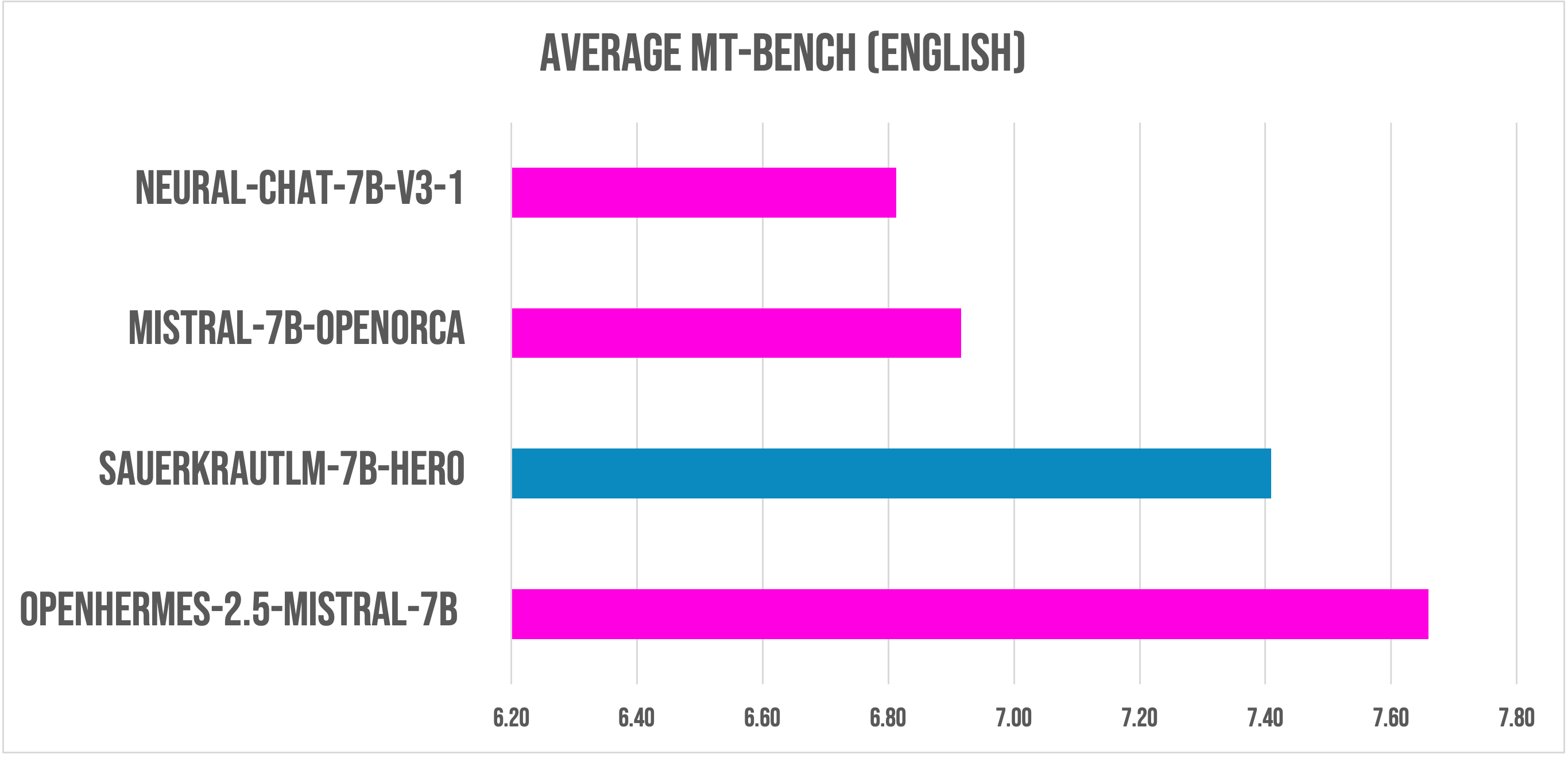
TheBloke's LLM work is generously supported by a grant from andreessen horowitz (a16z)
SauerkrautLM 7B HerO - GGUF
- Model creator: VAGO solutions
- Original model: SauerkrautLM 7B HerO
Description
This repo contains GGUF format model files for VAGO solutions's SauerkrautLM 7B HerO.
These files were quantised using hardware kindly provided by Massed Compute.
About GGUF
GGUF is a new format introduced by the llama.cpp team on August 21st 2023. It is a replacement for GGML, which is no longer supported by llama.cpp.
Here is an incomplete list of clients and libraries that are known to support GGUF:
- llama.cpp. The source project for GGUF. Offers a CLI and a server option.
- text-generation-webui, the most widely used web UI, with many features and powerful extensions. Supports GPU acceleration.
- KoboldCpp, a fully featured web UI, with GPU accel across all platforms and GPU architectures. Especially good for story telling.
- GPT4All, a free and open source local running GUI, supporting Windows, Linux and macOS with full GPU accel.
- LM Studio, an easy-to-use and powerful local GUI for Windows and macOS (Silicon), with GPU acceleration. Linux available, in beta as of 27/11/2023.
- LoLLMS Web UI, a great web UI with many interesting and unique features, including a full model library for easy model selection.
- Faraday.dev, an attractive and easy to use character-based chat GUI for Windows and macOS (both Silicon and Intel), with GPU acceleration.
- llama-cpp-python, a Python library with GPU accel, LangChain support, and OpenAI-compatible API server.
- candle, a Rust ML framework with a focus on performance, including GPU support, and ease of use.
- ctransformers, a Python library with GPU accel, LangChain support, and OpenAI-compatible AI server. Note, as of time of writing (November 27th 2023), ctransformers has not been updated in a long time and does not support many recent models.
Repositories available
- AWQ model(s) for GPU inference.
- GPTQ models for GPU inference, with multiple quantisation parameter options.
- 2, 3, 4, 5, 6 and 8-bit GGUF models for CPU+GPU inference
- VAGO solutions's original unquantised fp16 model in pytorch format, for GPU inference and for further conversions
Prompt template: ChatML
<|im_start|>system
{system_message}<|im_end|>
<|im_start|>user
{prompt}<|im_end|>
<|im_start|>assistant
Compatibility
These quantised GGUFv2 files are compatible with llama.cpp from August 27th onwards, as of commit d0cee0d
They are also compatible with many third party UIs and libraries - please see the list at the top of this README.
Explanation of quantisation methods
Click to see details
The new methods available are:
- GGML_TYPE_Q2_K - "type-1" 2-bit quantization in super-blocks containing 16 blocks, each block having 16 weight. Block scales and mins are quantized with 4 bits. This ends up effectively using 2.5625 bits per weight (bpw)
- GGML_TYPE_Q3_K - "type-0" 3-bit quantization in super-blocks containing 16 blocks, each block having 16 weights. Scales are quantized with 6 bits. This end up using 3.4375 bpw.
- GGML_TYPE_Q4_K - "type-1" 4-bit quantization in super-blocks containing 8 blocks, each block having 32 weights. Scales and mins are quantized with 6 bits. This ends up using 4.5 bpw.
- GGML_TYPE_Q5_K - "type-1" 5-bit quantization. Same super-block structure as GGML_TYPE_Q4_K resulting in 5.5 bpw
- GGML_TYPE_Q6_K - "type-0" 6-bit quantization. Super-blocks with 16 blocks, each block having 16 weights. Scales are quantized with 8 bits. This ends up using 6.5625 bpw
Refer to the Provided Files table below to see what files use which methods, and how.
Provided files
| Name | Quant method | Bits | Size | Max RAM required | Use case |
|---|---|---|---|---|---|
| sauerkrautlm-7b-hero.Q2_K.gguf | Q2_K | 2 | 3.08 GB | 5.58 GB | smallest, significant quality loss - not recommended for most purposes |
| sauerkrautlm-7b-hero.Q3_K_S.gguf | Q3_K_S | 3 | 3.16 GB | 5.66 GB | very small, high quality loss |
| sauerkrautlm-7b-hero.Q3_K_M.gguf | Q3_K_M | 3 | 3.52 GB | 6.02 GB | very small, high quality loss |
| sauerkrautlm-7b-hero.Q3_K_L.gguf | Q3_K_L | 3 | 3.82 GB | 6.32 GB | small, substantial quality loss |
| sauerkrautlm-7b-hero.Q4_0.gguf | Q4_0 | 4 | 4.11 GB | 6.61 GB | legacy; small, very high quality loss - prefer using Q3_K_M |
| sauerkrautlm-7b-hero.Q4_K_S.gguf | Q4_K_S | 4 | 4.14 GB | 6.64 GB | small, greater quality loss |
| sauerkrautlm-7b-hero.Q4_K_M.gguf | Q4_K_M | 4 | 4.37 GB | 6.87 GB | medium, balanced quality - recommended |
| sauerkrautlm-7b-hero.Q5_0.gguf | Q5_0 | 5 | 5.00 GB | 7.50 GB | legacy; medium, balanced quality - prefer using Q4_K_M |
| sauerkrautlm-7b-hero.Q5_K_S.gguf | Q5_K_S | 5 | 5.00 GB | 7.50 GB | large, low quality loss - recommended |
| sauerkrautlm-7b-hero.Q5_K_M.gguf | Q5_K_M | 5 | 5.13 GB | 7.63 GB | large, very low quality loss - recommended |
| sauerkrautlm-7b-hero.Q6_K.gguf | Q6_K | 6 | 5.94 GB | 8.44 GB | very large, extremely low quality loss |
| sauerkrautlm-7b-hero.Q8_0.gguf | Q8_0 | 8 | 7.70 GB | 10.20 GB | very large, extremely low quality loss - not recommended |
Note: the above RAM figures assume no GPU offloading. If layers are offloaded to the GPU, this will reduce RAM usage and use VRAM instead.
How to download GGUF files
Note for manual downloaders: You almost never want to clone the entire repo! Multiple different quantisation formats are provided, and most users only want to pick and download a single file.
The following clients/libraries will automatically download models for you, providing a list of available models to choose from:
- LM Studio
- LoLLMS Web UI
- Faraday.dev
In text-generation-webui
Under Download Model, you can enter the model repo: TheBloke/SauerkrautLM-7B-HerO-GGUF and below it, a specific filename to download, such as: sauerkrautlm-7b-hero.Q4_K_M.gguf.
Then click Download.
On the command line, including multiple files at once
I recommend using the huggingface-hub Python library:
pip3 install huggingface-hub
Then you can download any individual model file to the current directory, at high speed, with a command like this:
huggingface-cli download TheBloke/SauerkrautLM-7B-HerO-GGUF sauerkrautlm-7b-hero.Q4_K_M.gguf --local-dir . --local-dir-use-symlinks False
More advanced huggingface-cli download usage (click to read)
You can also download multiple files at once with a pattern:
huggingface-cli download TheBloke/SauerkrautLM-7B-HerO-GGUF --local-dir . --local-dir-use-symlinks False --include='*Q4_K*gguf'
For more documentation on downloading with huggingface-cli, please see: HF -> Hub Python Library -> Download files -> Download from the CLI.
To accelerate downloads on fast connections (1Gbit/s or higher), install hf_transfer:
pip3 install hf_transfer
And set environment variable HF_HUB_ENABLE_HF_TRANSFER to 1:
HF_HUB_ENABLE_HF_TRANSFER=1 huggingface-cli download TheBloke/SauerkrautLM-7B-HerO-GGUF sauerkrautlm-7b-hero.Q4_K_M.gguf --local-dir . --local-dir-use-symlinks False
Windows Command Line users: You can set the environment variable by running set HF_HUB_ENABLE_HF_TRANSFER=1 before the download command.
Example llama.cpp command
Make sure you are using llama.cpp from commit d0cee0d or later.
./main -ngl 35 -m sauerkrautlm-7b-hero.Q4_K_M.gguf --color -c 32768 --temp 0.7 --repeat_penalty 1.1 -n -1 -p "<|im_start|>system\n{system_message}<|im_end|>\n<|im_start|>user\n{prompt}<|im_end|>\n<|im_start|>assistant"
Change -ngl 32 to the number of layers to offload to GPU. Remove it if you don't have GPU acceleration.
Change -c 32768 to the desired sequence length. For extended sequence models - eg 8K, 16K, 32K - the necessary RoPE scaling parameters are read from the GGUF file and set by llama.cpp automatically. Note that longer sequence lengths require much more resources, so you may need to reduce this value.
If you want to have a chat-style conversation, replace the -p <PROMPT> argument with -i -ins
For other parameters and how to use them, please refer to the llama.cpp documentation
How to run in text-generation-webui
Further instructions can be found in the text-generation-webui documentation, here: text-generation-webui/docs/04 ‐ Model Tab.md.
How to run from Python code
You can use GGUF models from Python using the llama-cpp-python or ctransformers libraries. Note that at the time of writing (Nov 27th 2023), ctransformers has not been updated for some time and is not compatible with some recent models. Therefore I recommend you use llama-cpp-python.
How to load this model in Python code, using llama-cpp-python
For full documentation, please see: llama-cpp-python docs.
First install the package
Run one of the following commands, according to your system:
# Base ctransformers with no GPU acceleration
pip install llama-cpp-python
# With NVidia CUDA acceleration
CMAKE_ARGS="-DLLAMA_CUBLAS=on" pip install llama-cpp-python
# Or with OpenBLAS acceleration
CMAKE_ARGS="-DLLAMA_BLAS=ON -DLLAMA_BLAS_VENDOR=OpenBLAS" pip install llama-cpp-python
# Or with CLBLast acceleration
CMAKE_ARGS="-DLLAMA_CLBLAST=on" pip install llama-cpp-python
# Or with AMD ROCm GPU acceleration (Linux only)
CMAKE_ARGS="-DLLAMA_HIPBLAS=on" pip install llama-cpp-python
# Or with Metal GPU acceleration for macOS systems only
CMAKE_ARGS="-DLLAMA_METAL=on" pip install llama-cpp-python
# In windows, to set the variables CMAKE_ARGS in PowerShell, follow this format; eg for NVidia CUDA:
$env:CMAKE_ARGS = "-DLLAMA_OPENBLAS=on"
pip install llama-cpp-python
Simple llama-cpp-python example code
from llama_cpp import Llama
# Set gpu_layers to the number of layers to offload to GPU. Set to 0 if no GPU acceleration is available on your system.
llm = Llama(
model_path="./sauerkrautlm-7b-hero.Q4_K_M.gguf", # Download the model file first
n_ctx=32768, # The max sequence length to use - note that longer sequence lengths require much more resources
n_threads=8, # The number of CPU threads to use, tailor to your system and the resulting performance
n_gpu_layers=35 # The number of layers to offload to GPU, if you have GPU acceleration available
)
# Simple inference example
output = llm(
"<|im_start|>system\n{system_message}<|im_end|>\n<|im_start|>user\n{prompt}<|im_end|>\n<|im_start|>assistant", # Prompt
max_tokens=512, # Generate up to 512 tokens
stop=["</s>"], # Example stop token - not necessarily correct for this specific model! Please check before using.
echo=True # Whether to echo the prompt
)
# Chat Completion API
llm = Llama(model_path="./sauerkrautlm-7b-hero.Q4_K_M.gguf", chat_format="llama-2") # Set chat_format according to the model you are using
llm.create_chat_completion(
messages = [
{"role": "system", "content": "You are a story writing assistant."},
{
"role": "user",
"content": "Write a story about llamas."
}
]
)
How to use with LangChain
Here are guides on using llama-cpp-python and ctransformers with LangChain:
Discord
For further support, and discussions on these models and AI in general, join us at:
Thanks, and how to contribute
Thanks to the chirper.ai team!
Thanks to Clay from gpus.llm-utils.org!
I've had a lot of people ask if they can contribute. I enjoy providing models and helping people, and would love to be able to spend even more time doing it, as well as expanding into new projects like fine tuning/training.
If you're able and willing to contribute it will be most gratefully received and will help me to keep providing more models, and to start work on new AI projects.
Donaters will get priority support on any and all AI/LLM/model questions and requests, access to a private Discord room, plus other benefits.
- Patreon: https://patreon.com/TheBlokeAI
- Ko-Fi: https://ko-fi.com/TheBlokeAI
Special thanks to: Aemon Algiz.
Patreon special mentions: Brandon Frisco, LangChain4j, Spiking Neurons AB, transmissions 11, Joseph William Delisle, Nitin Borwankar, Willem Michiel, Michael Dempsey, vamX, Jeffrey Morgan, zynix, jjj, Omer Bin Jawed, Sean Connelly, jinyuan sun, Jeromy Smith, Shadi, Pawan Osman, Chadd, Elijah Stavena, Illia Dulskyi, Sebastain Graf, Stephen Murray, terasurfer, Edmond Seymore, Celu Ramasamy, Mandus, Alex, biorpg, Ajan Kanaga, Clay Pascal, Raven Klaugh, 阿明, K, ya boyyy, usrbinkat, Alicia Loh, John Villwock, ReadyPlayerEmma, Chris Smitley, Cap'n Zoog, fincy, GodLy, S_X, sidney chen, Cory Kujawski, OG, Mano Prime, AzureBlack, Pieter, Kalila, Spencer Kim, Tom X Nguyen, Stanislav Ovsiannikov, Michael Levine, Andrey, Trailburnt, Vadim, Enrico Ros, Talal Aujan, Brandon Phillips, Jack West, Eugene Pentland, Michael Davis, Will Dee, webtim, Jonathan Leane, Alps Aficionado, Rooh Singh, Tiffany J. Kim, theTransient, Luke @flexchar, Elle, Caitlyn Gatomon, Ari Malik, subjectnull, Johann-Peter Hartmann, Trenton Dambrowitz, Imad Khwaja, Asp the Wyvern, Emad Mostaque, Rainer Wilmers, Alexandros Triantafyllidis, Nicholas, Pedro Madruga, SuperWojo, Harry Royden McLaughlin, James Bentley, Olakabola, David Ziegler, Ai Maven, Jeff Scroggin, Nikolai Manek, Deo Leter, Matthew Berman, Fen Risland, Ken Nordquist, Manuel Alberto Morcote, Luke Pendergrass, TL, Fred von Graf, Randy H, Dan Guido, NimbleBox.ai, Vitor Caleffi, Gabriel Tamborski, knownsqashed, Lone Striker, Erik Bjäreholt, John Detwiler, Leonard Tan, Iucharbius
Thank you to all my generous patrons and donaters!
And thank you again to a16z for their generous grant.
Original model card: VAGO solutions's SauerkrautLM 7B HerO
VAGO solutions SauerkrautLM-7b-HerO
Introducing SauerkrautLM-7b-HerO – the pinnacle of German language model technology! Crafted through the merging of Teknium's OpenHermes-2.5-Mistral-7B and Open-Orca's Mistral-7B-OpenOrca and uniquely fine-tuned with the Sauerkraut dataset. SauerkrautLM-7b-HerO represents a breakthrough in language modeling, achieving an optimal balance between extensive German data and essential international sources. This ensures the model not only excels in understanding the nuances of the German language but also retains its global capabilities. Harnessing the innovative power of the gradient SLERP method from MergeKit, we've achieved a groundbreaking fusion of two of the most best performing 7B models based on the Mistral framework. This merge has allowed us to combine the best features of both models, creating an unparalleled synergy. Coupled with the German Sauerkraut dataset, which consists of a mix of augmented and translated data, we have successfully taught the English-speaking merged model the intricacies of the German language. This was achieved without the typical loss of core competencies often associated with fine-tuning in another language of models previously trained mainly in English. Our approach ensures that the model retains its original strengths while acquiring a profound understanding of German, setting a new benchmark in bilingual language model proficiency.
Table of Contents
- Overview of all Her0 models
- Model Details
- Evaluation
- Disclaimer
- Contact
- Collaborations
- Acknowledgement
All HerO Models
| Model | HF | GPTQ | GGUF | AWQ |
|---|---|---|---|---|
| SauerkrautLM-7b-HerO | Link | coming soon | coming soon | coming soon |
Model Details
SauerkrautLM-7b-HerO
- Model Type: SauerkrautLM-7b-HerO is an auto-regressive language model based on the transformer architecture
- Language(s): English, German
- License: APACHE 2.0
- Contact: Website David Golchinfar
Training Dataset:
SauerkrautLM-7b-HerO was trained with mix of German data augmentation and translated data. We found, that only a simple translation of training data can lead to unnatural German phrasings. Data augmentation techniques were used to grant grammatical, syntactical correctness and a more natural German wording in our training data.
Merge Procedure:
SauerkrautLM-7b-HerO was merged on 1 A100 with mergekit. The merged model contains OpenHermes-2.5-Mistral-7B and Open-Orca/Mistral-7B-OpenOrca. We applied the gradient SLERP method.
Prompt Template:
<|im_start|>system
Du bist Sauerkraut-HerO, ein großes Sprachmodell, das höflich und kompetent antwortet. Schreibe deine Gedanken Schritt für Schritt auf, um Probleme sinnvoll zu lösen.<|im_end|>
<|im_start|>user
Wie geht es dir?<|im_end|>
<|im_start|>assistant
Mir geht es gut!<|im_end|>
<|im_start|>user
Bitte erkläre mir, wie die Zusammenführung von Modellen durch bestehende Spitzenmodelle profitieren kann.<|im_end|>
<|im_start|>assistant
Evaluation
GPT4ALL:
Compared to relevant German Closed and Open Source models
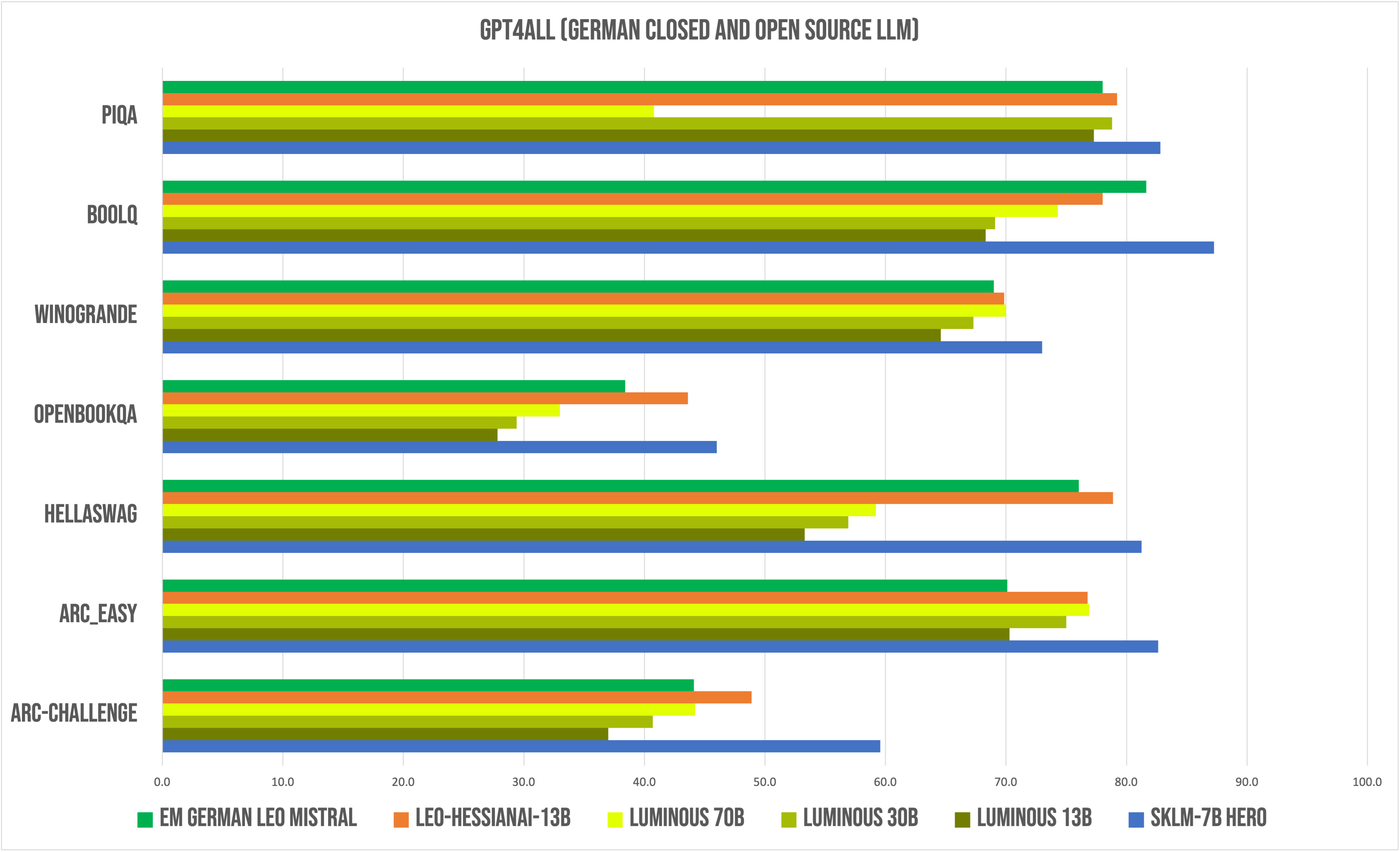
Language Model evaluation Harness:
Compared to Aleph Alpha Luminous Models
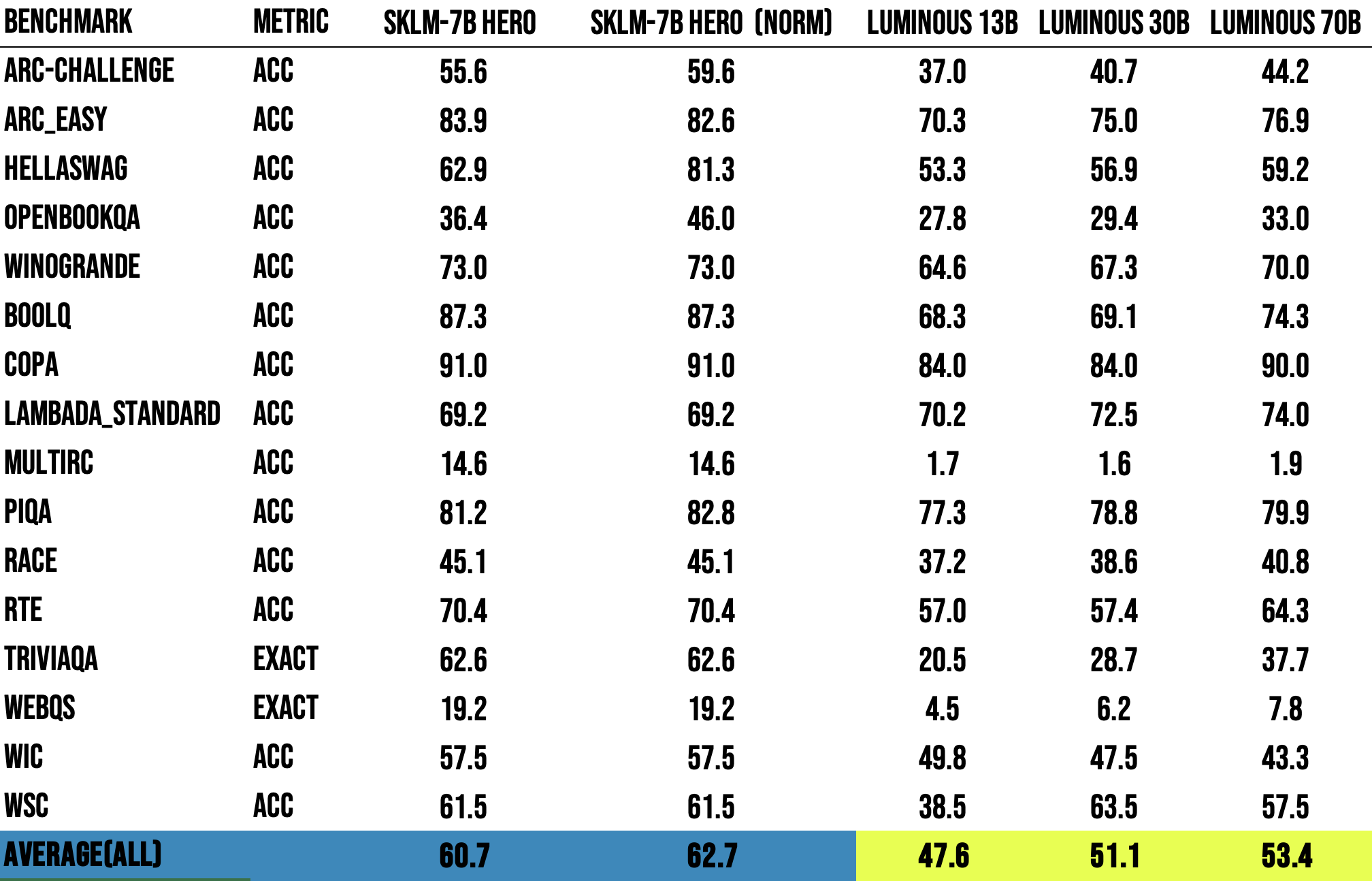
*performed with newest Language Model Evaluation Harness
Big Bench:
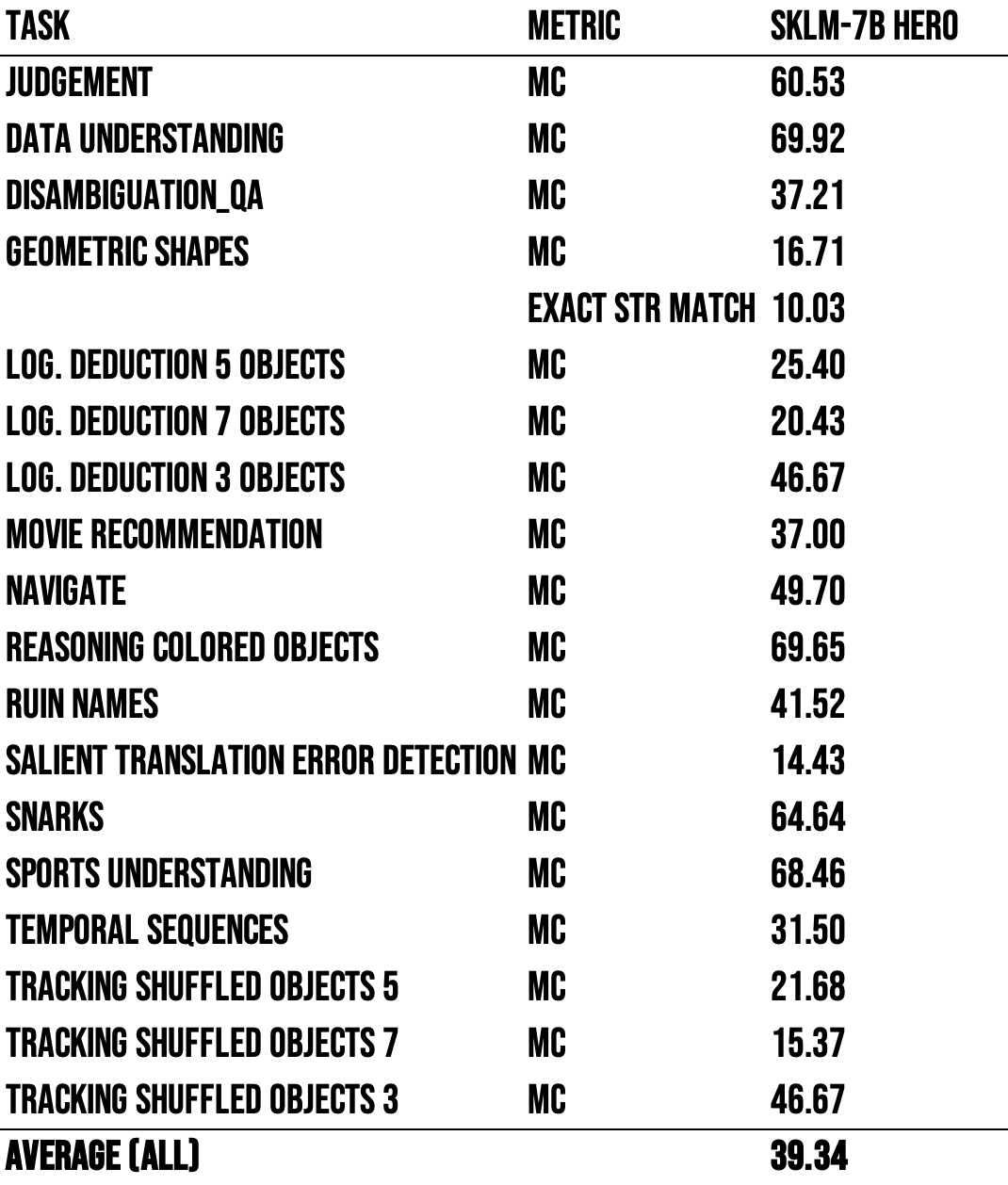 *performed with newest Language Model Evaluation Harness
*performed with newest Language Model Evaluation Harness
MMLU:
Compared to Big Boy LLMs (Grok0,Grok1,GPT3.5,GPT4)
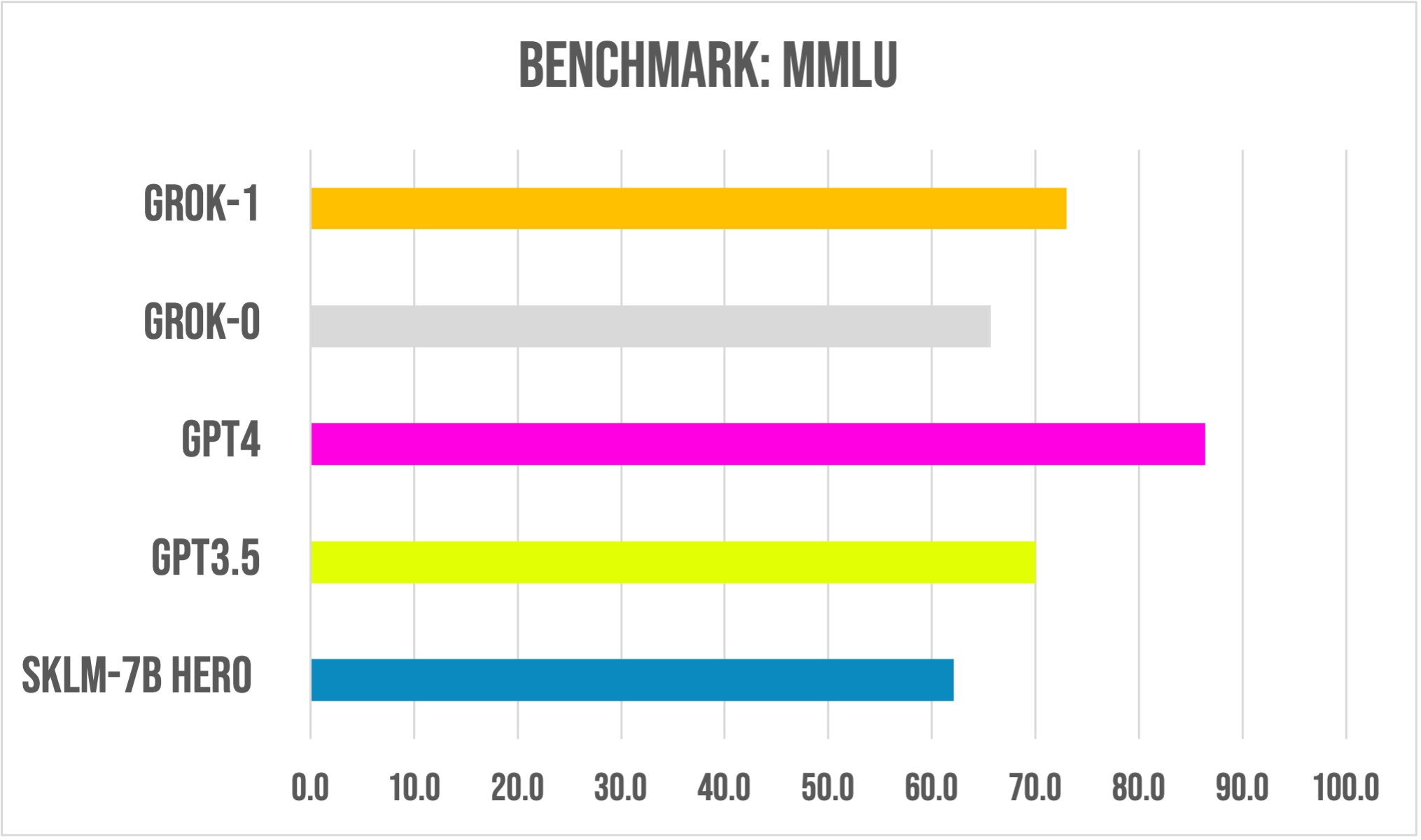
TruthfulQA:
Compared to OpenAI Models (GPT3.5,GPT4)
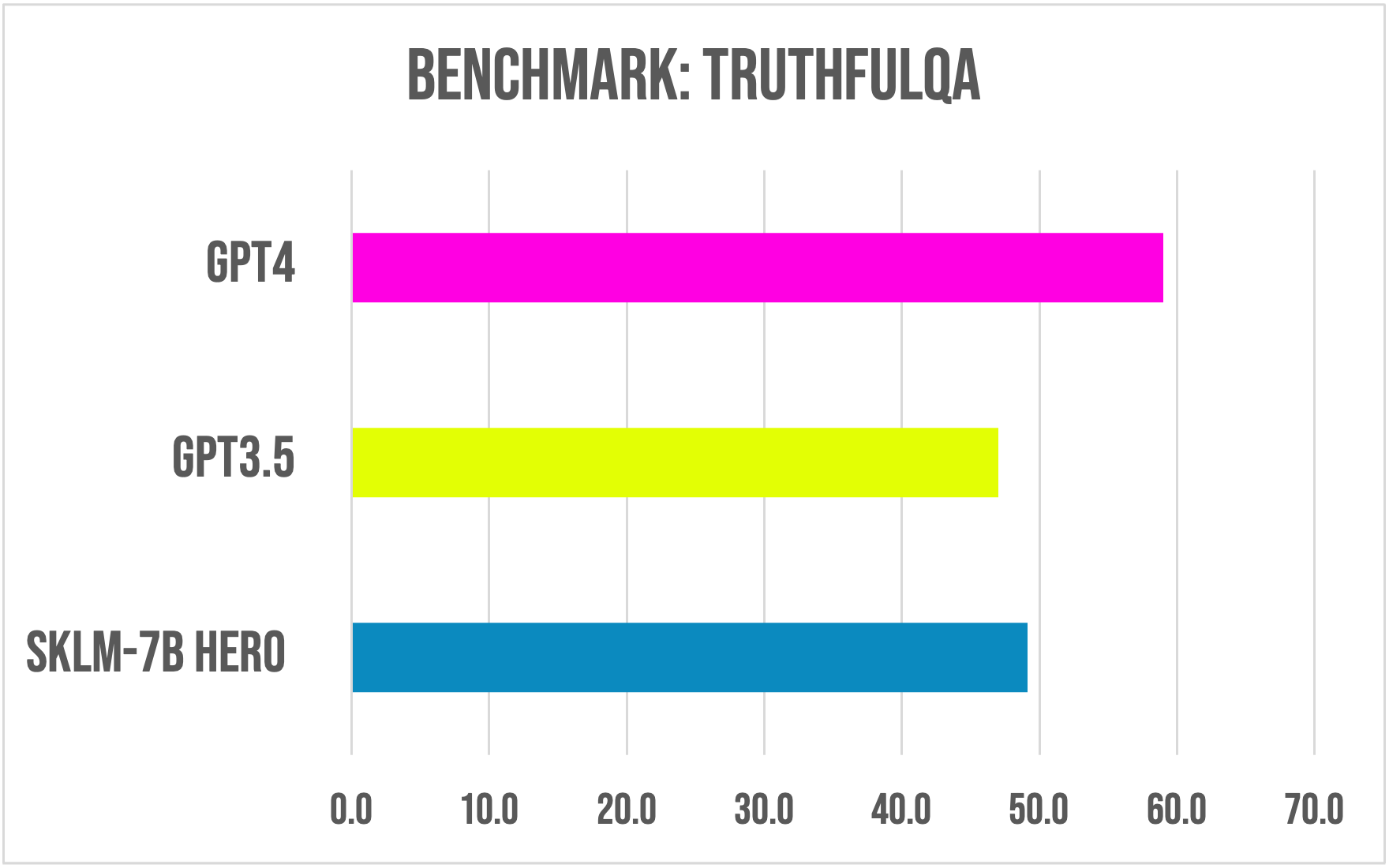
MT-Bench (German):
########## First turn ##########
score
model turn
SauerkrautLM-70b-v1 1 7.25000
SauerkrautLM-7b-HerO <--- 1 6.96875
SauerkrautLM-7b-v1-mistral 1 6.30625
leo-hessianai-13b-chat 1 6.18750
SauerkrautLM-13b-v1 1 6.16250
leo-mistral-hessianai-7b-chat 1 6.15625
Llama-2-70b-chat-hf 1 6.03750
vicuna-13b-v1.5 1 5.80000
SauerkrautLM-7b-v1 1 5.65000
leo-hessianai-7b-chat 1 5.52500
vicuna-7b-v1.5 1 5.42500
Mistral-7B-v0.1 1 5.37500
SauerkrautLM-3b-v1 1 3.17500
Llama-2-7b 1 1.28750
open_llama_3b_v2 1 1.68750
########## Second turn ##########
score
model turn
SauerkrautLM-70b-v1 2 6.83125
SauerkrautLM-7b-HerO <--- 2 6.30625
vicuna-13b-v1.5 2 5.63125
SauerkrautLM-13b-v1 2 5.34375
SauerkrautLM-7b-v1-mistral 2 5.26250
leo-mistral-hessianai-7b-chat 2 4.99375
SauerkrautLM-7b-v1 2 4.73750
leo-hessianai-13b-chat 2 4.71250
vicuna-7b-v1.5 2 4.67500
Llama-2-70b-chat-hf 2 4.66250
Mistral-7B-v0.1 2 4.53750
leo-hessianai-7b-chat 2 2.65000
SauerkrautLM-3b-v1 2 1.98750
open_llama_3b_v2 2 1.22500
Llama-2-7b 2 1.07500
########## Average ##########
score
model
SauerkrautLM-70b-v1 7.040625
SauerkrautLM-7b-HerO <--- 6.637500
SauerkrautLM-7b-v1-mistral 5.784375
SauerkrautLM-13b-v1 5.753125
vicuna-13b-v1.5 5.715625
leo-mistral-hessianai-7b-chat 5.575000
leo-hessianai-13b-chat 5.450000
Llama-2-70b-chat-hf 5.350000
SauerkrautLM-v1-7b 5.193750
vicuna-7b-v1.5 5.050000
Mistral-7B-v0.1 4.956250
leo-hessianai-7b-chat 4.087500
SauerkrautLM-3b-v1 2.581250
open_llama_3b_v2 1.456250
Llama-2-7b 1.181250
*performed with the newest FastChat Version
MT-Bench (English):
########## First turn ##########
score
model turn
OpenHermes-2.5-Mistral-7B 1 8.21875
SauerkrautLM-7b-HerO <--- 1 8.03125
Mistral-7B-OpenOrca 1 7.65625
neural-chat-7b-v3-1 1 7.22500
########## Second turn ##########
score
model turn
OpenHermes-2.5-Mistral-7B 2 7.1000
SauerkrautLM-7b-HerO <--- 2 6.7875
neural-chat-7b-v3-1 2 6.4000
Mistral-7B-OpenOrca 2 6.1750
########## Average ##########
score
model
OpenHermes-2.5-Mistral-7B 7.659375
SauerkrautLM-7b-HerO <--- 7.409375
Mistral-7B-OpenOrca 6.915625
neural-chat-7b-v3-1 6.812500
*performed with the newest FastChat Version
Additional German Benchmark results:
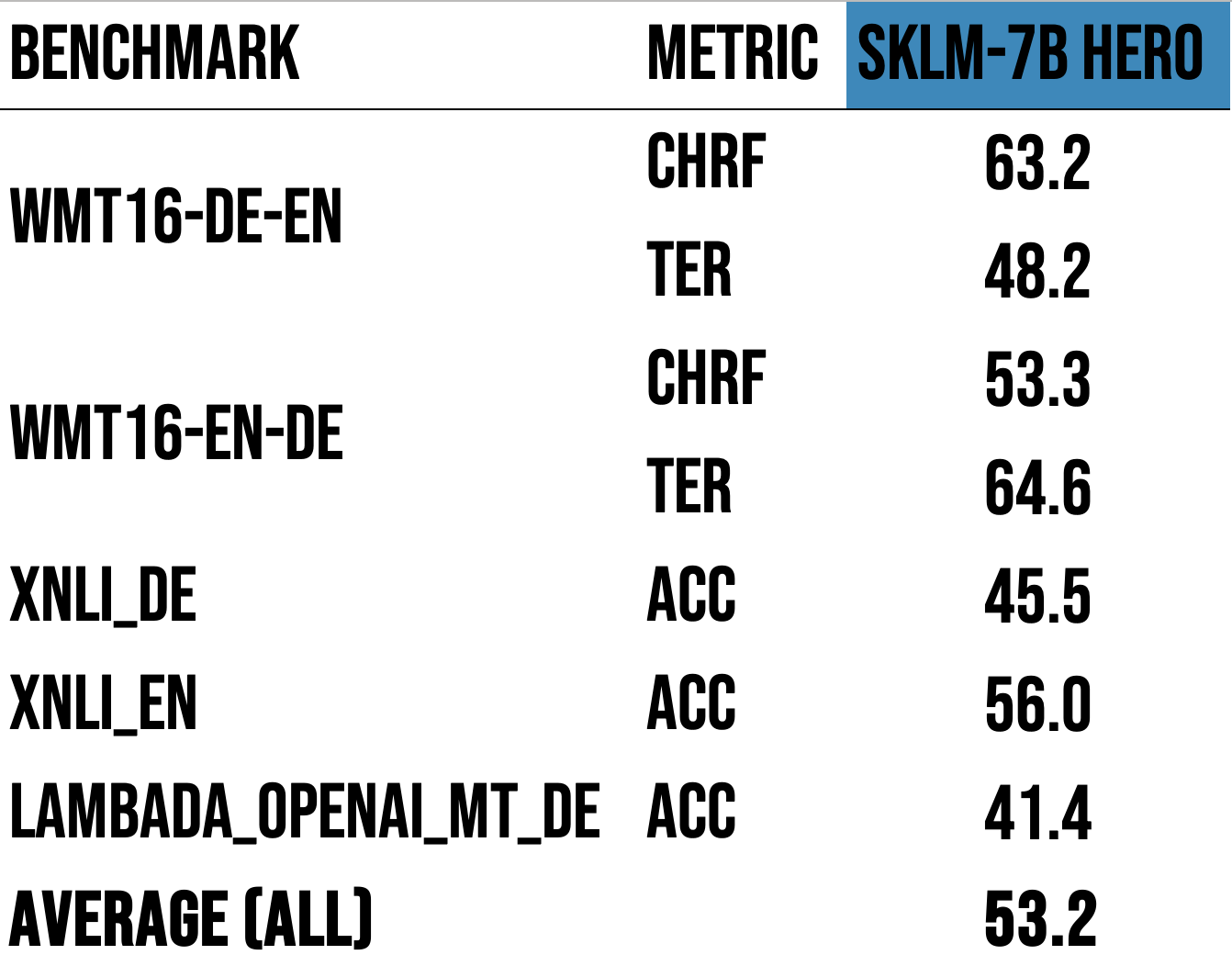 *performed with newest Language Model Evaluation Harness
*performed with newest Language Model Evaluation Harness
Disclaimer
We must inform users that despite our best efforts in data cleansing, the possibility of uncensored content slipping through cannot be entirely ruled out. However, we cannot guarantee consistently appropriate behavior. Therefore, if you encounter any issues or come across inappropriate content, we kindly request that you inform us through the contact information provided. Additionally, it is essential to understand that the licensing of these models does not constitute legal advice. We are not held responsible for the actions of third parties who utilize our models. These models may be employed for commercial purposes, and the Apache 2.0 remains applicable and is included with the model files.
Contact
If you are interested in customized LLMs for business applications, please get in contact with us via our website or contact us at Dr. Daryoush Vaziri. We are also grateful for your feedback and suggestions.
Collaborations
We are also keenly seeking support and investment for our startup, VAGO solutions, where we continuously advance the development of robust language models designed to address a diverse range of purposes and requirements. If the prospect of collaboratively navigating future challenges excites you, we warmly invite you to reach out to us.
Acknowledgement
Many thanks to OpenOrca and teknium for providing such valuable models to the Open-Source community.
- Downloads last month
- 409
Model tree for TheBloke/SauerkrautLM-7B-HerO-GGUF
Base model
VAGOsolutions/SauerkrautLM-7b-HerO
